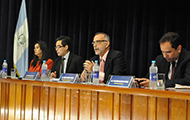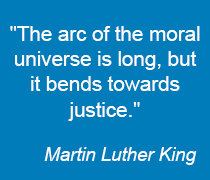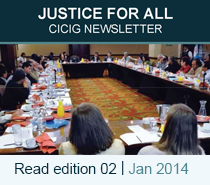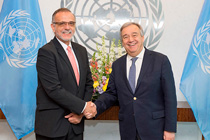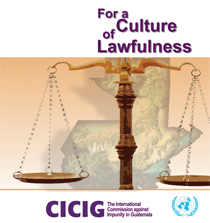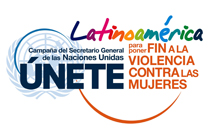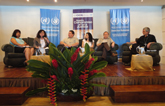 See video
See video
Guatemala, July 12, 2011. Insecurity, violence, drug trafficking, organized crime, impunity and corruption were among the topics addressed by authorities, local representatives and the CICIG Commissioner at the forum "Petén, how many more? The road to overcoming impunity", which was recently held in the Petén Department. The event was organized by the Office of High Commissioner for Human Rights in Guatemala (OACDH), the International Commission against Impunity in Guatemala (CICIG) and the Human Rights Federation (CDH).
The event included the participation of Francisco Javier Dall'Anese Ruiz, head of CICIG; Claudia Paz y Paz, Attorney General of the Republic; Mario Fiandri, Bishop of the Apostolic Vicariate of Petén; Rosa María Chan, Director of the Pro Petén Foundation; and Rudel Mauricio Álvarez, Governor of Petén. The moderator of the event was the journalist Marielos Monzón.
"The problem is that the low tax revenue in the country prevents any governor from having a good police force or providing life and human development opportunities; and until this situation changes, insecurity will continue to be a problem in the Department."
Francisco Javier Dall'Anese Ruiz
CICIG Commissioner
Alberto Brunori, Representative of the Office of High Commissioner for Human Rights in Guatemala said the objective of the activity was to create an opportunity to maintain a dialogue and reflect so as to attend the needs of, and stand in solidarity, with the inhabitants of Petén due to the violence problems they are facing.
"Among the structural causes of the worsening security situation is the geographical location of Petén, which has become a zone of trafficking in drugs, arms, migrants and humans. The lack of legal certainty has favoured a process of land concentration, enabling large livestock ranches to operate, devastating ecosystems and also being used for money laundering," he explained.
He added that the communities have ended up in the midst of this situation, making them vulnerable to the acts of violence recorded in the Department: "There have been criminal complaints regarding strategies to strip peasants of their land as well as those concerning threats and bribes to work on the livestock fincas."
Violence, drug trafficking and organized crime
The discussion was opened by Rosa María Chan, Director of the Pro Petén Foundation, who said the Department had become vulnerable to drug trafficking and organized crime activities due to its proximity to the northern border with Mexico.
"This Department is institutionally weak in relation to justice, protection of protected areas and civil society participation, which often avoids participation due to fears; therefore, these areas should be strengthened so Petén can emerge from the crisis it is facing," she said.
Mario Fiandri, Bishop of the Apostolic Vicariate of Petén, said that to overcome violence in Petén, the structural roots of the problem must be tackled, such as illegality, impunity, corruption, politicking, organized crime and drug trafficking.
"The enrooted violence in our country is the real issue that must be addressed by seeking comprehensive, long-term solutions through constructive dialogue and citizen participation, and not by adopting reactive, populist solutions. The response should come from all sectors, and not just the State or the Church," he stressed.
Rudel Mauricio Álvarez, Governor of Petén, said that an increase in violence levels could be expected due to the growing drug trafficking activity in the Department, as demonstrated by the murdering of 27 peasants on May 15, 2013.
"There has been an increase in the number of kidnappings and extortions as well as in the operations of drug trafficking groups and organized crime, which operate both in the towns of Petén and in urban areas. Drug trafficking has the power to corrupt individuals; and such situations have previously been tolerated by the authorities and, therefore, changes have been implemented among the National Civil Police (PNC) officers," he said.
In her address, Attorney General Claudia Paz y Paz said that because of its structural weaknesses, Petén had become an ideal location to traffick in drugs, arms, humans and protected species. "Petén is an area through which drugs originating from Colombia are transported, passing through Central American countries and reaching the Department, before continuing along their course to the US."
She added that due to the fight against drug trafficking in Mexico and the state of siege in Alta Verapaz, drug trafficking operations may have shifted to Petén, causing an increase in violence in the area over recent months, as demonstrated by the massacre of 27 peasants.
According to Commissioner Dall'Anese, Petén is an abandoned region that has been left at the mercy of organized crime, which has taken advantage of the opportunities left behind by the State's failure to invest in the human development of the Petén Department.
"The problem is that the low tax revenue in the country prevents any governor from having a good police force or providing life and human development opportunities; and until this situation changes, insecurity will continue to be a problem in the Department," he said.
He believes that a policy of "aggressive prosecution" should be developed, but said that nothing can be done without funding; especially in consideration of the fact that justice institutions have announced that by October they will no longer have any funds to continue operating.
He said the main concern for authorities at present should be preventing more crimes from being commited in the Department, because security is a right held by every inhabitant on the planet.
Solutions
"All perpetrators should be investigated and brought to justice, regardless of whether they are individuals or national or foreign officials, because by doing so, a message will be sent: life has a value and whoever breaches the right to life will be punished in accordance with the law," said the Attorney General.
However, she stated that due to the MP's lack of budget, it is difficult to fight organized crime and drug trafficking. "The lesson to be learnt from the massacre of the 27 peasants is that coordination efforts must be doubled with the Ministry of the Interior, Mexican authorities and Central American authorities, in response to what is a regional problem.
"If we do not strengthen the cooperation ties between the Attorney General's Office of Mexico and the rest of the Central American public prosecution offices and security forces, we are only going to be able to react to, and not prevent, facts of this type," said Attorney General Paz y Paz.
According to the Commissioner, political planning is called for in order to allow every citizen to freely exercise his or her rights and to live calmly, without fearing becoming a crime victim. "Work must be done to eradicate poverty, create human development opportunities, strengthen security forces and thereby prevent individuals from joining organized crime groups and striking fear into citizens," he commented.
The Commissioner believed that states of siege, such as that which is currently in force in Petén, are transitional measures and do not constitute a permanent means of existence for the inhabitants of a country, because "nobody should see their house become a kind of prison due to criminals' freedom to act without facing punishment."
Crime prevention
Monsignor Fiandri said that if authorities worked to prevent crimes, money would be saved and people could live in a safe and secure environment: "Investments must be made in education for the common good of the country; an educated youth with opportunities will be less likely to become involved in crime, drug trafficking and corrupt acts.
Governor Álvarez said that in 2009 there were 482 violent deaths, which then fell to 385 in 2010, with the support of security forces and justice institutions. Therefore, he said that after the state of siege in Petén, work will be done to operate a Security Commission, because through interinstitutional coordination positive results have been achieved in the fight against criminal groups.
"As to impunity, there are bodies responsible for tackling this scourge; we must work to prevent crimes and, in coordination with the MP, ensure kidnappers, extortionists and members of organized crime pay for their crimes," he said.
Drug trafficking in protected areas
As to the issue concerning the usurpation of fincas in protected areas by drug trafficking organizations, the Director of the Pro Petén Foundation, Rosa María Chan, said that the law must be enforced to evict so-called livestock farmers with large areas of land in these areas—a situation that negatively affects the ecosystem.
"Most of the fincas do not have livestock or grass, and they are used by drug traffickers; therefore, the law should be stringently enforced. However, a distinction must be drawn between these drug traffickers and the communities that live there because of poverty, without knowing the areas are protected," said Chan.
Governor Álvarez explained that through a national environmental security policy, 118,000 hectares of usurped land hand been recovered from organized crime groups. "It has been necessary to go directly to the fincas in order to execute the evictions, and we shall continue along the same lines, because we are obliged to recover areas usurped by 'narco-ranchers', who sadly take advantage of the needs of individuals so that they work for them," he said.
Conclusions
According to Attorney General Paz y Paz, the infiltration of drug trafficking and organized crime in the State is due to two situations: their capacity to cause violence and generate fear among justice officials and citizens in general, and through their ability to 'buy' government offices.
"The justice and security system have been infiltrated; therefore, as justice officials we must create the conditions needed to purge State institutions and identify the officials who have formed part of these criminal structures," he stressed.
According to the Commissioner, in order to reduce impunity levels in Guatemala, the Judiciary (OJ) must be independent and open to criticism, because civil society must not be barred from expressing its opinions regarding the rulings of judges, as requested recently by the judges of the Supreme Court of Justice in a statement to the media.
"Impunity is generated when judges seek to protect themselves through such prohibitions, which implies that society is unable to investigate justice officials when they commit corrupt acts or rule in breach of the law. Trials are public so that any citizen can arrive to observe how judges act and critique their case work," he added.
The CICIG Commissioner believes a judicial reform is needed so that judges are separate from politics, the executive branch and the legislative branch, such that they do not act in accordance with political or economic interests but rather the constitution of the Republic of Guatemala.
The panelists concluded that in order to succeed in the fight against drug trafficking and organized crime, the justice institutions should be strengthened and regional information exchange should be sought as a means of dismantling these criminal groups.


